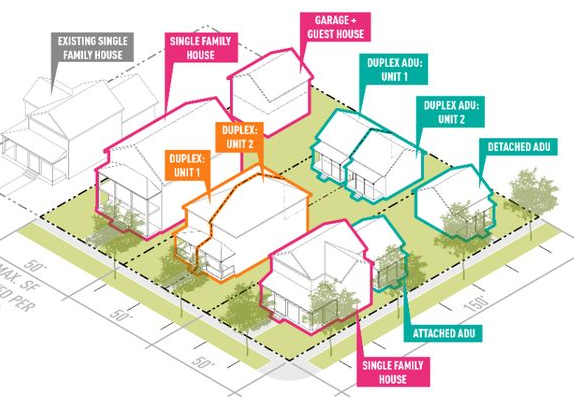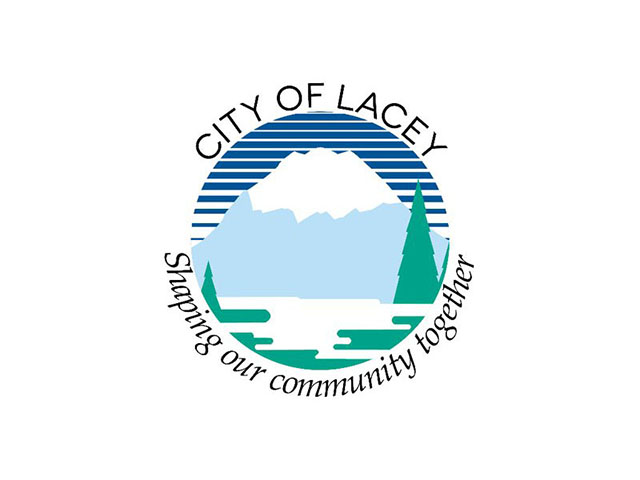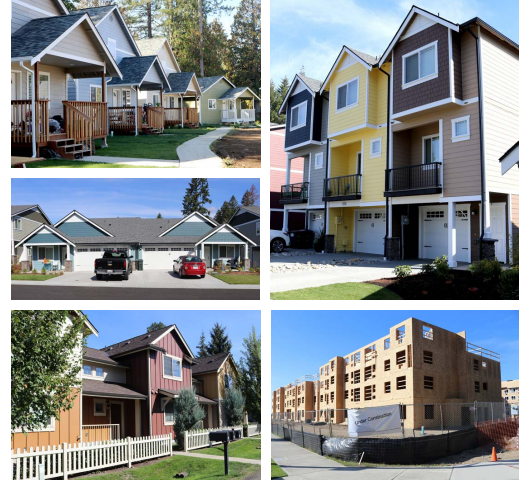
Washington state faces a housing affordability crisis. The pace of housing production has failed to match the surging demand. The imbalance between the strong demand for housing and the insufficient supply led to a rapid and unprecedented increase in home prices and rents. Consequently, many residents find themselves significantly rent-burdened, allocating more than 30% of their monthly income to housing costs. This situation challenges residents seeking safe and adequate housing that aligns with their basic needs at an affordable price. The impact is particularly pronounced for lower-income households, which face limited or no affordable housing options within their local community.
What is Middle Housing?
According to the Revised Code of Washington (RCWs), “Middle Housing” means buildings that are compatible in scale, form and character with single-family houses and contain two or more attached, stacked, or clustered homes including duplexes, triplexes, fourplexes, fiveplexes, sixplexes, townhouses, stacked flats, courtyard apartments, and cottage housing.

To address the housing challenges faced statewide, the Washington Legislature passed House Bill 1110 (HB 1110) in July of 2023. The aim is to offer Washington residents more housing options, particularly in terms of size and affordability for the long term. This legislation permits the construction of various traditional housing types, collectively known as “middle housing”, including duplexes, triplexes, fourplexes, fiveplexes, sixplexes, stacked flats, courtyard apartments, cottage clusters, and townhomes. These structures can now be built in areas where only single-family detached housing was previously allowed. By expanding the housing supply, the goal is to enhance affordability and meet the diverse housing needs of various demographic groups, including younger and older individuals and those unable to afford large, detached houses.
What legislation guides Middle Housing policy?
In 2023, the Washington State Legislature adopted a set of very significant changes to local government’s authority to write zoning and development standards. The housing-related bills that impact changes in local policy include House Bill 1110 (Middle Housing), and House Bill 1337 (Accessory Dwelling Unit Support). These and other housing laws provide specific direction to cities, including Lacey, to change zoning and standards in order to promote housing supply and choice, and provide homeownership and rental opportunities that adequately meet a broader range of income classes.
How will Lacey support Middle Housing?
The implementation of HB 1110 involves amending the Lacey Land Use Code, a crucial step in the city’s ongoing housing -related initiatives. The Land Use Code serves as a framework governing what, where, and how construction occurs in Lacey. Collaboratively setting regulations that are fair and uphold community values, such as open space preservation is a collective effort. Updating regulations related to middle housing can streamline the development making it faster, more widespread, cost-effective, and fostering social equity and diversity.
What has Lacey already done and what must Lacey do to meet new regulations?
What is the project timeline?
Read more about the City’s timeline for middle housing implementation below.
What are some frequently asked questions about Middle Housing?
The following guide may assist in answering some commonly asked questions about Middle Housing.
How can I learn more about Middle Housing?
Under the 2023 statutory requirements, the Washington State Department of Commerce provides technical assistance to local governments when they are in the process of creating and adopting new regulations (RCW 36370A.636).
The following middle housing resources were developed by Commerce and provided to cities and counties who fully plan under the Washington State Growth Management Act (GMA) to make available to our local community. These resources may help understand middle housing concepts and implementation across diverse communities, and housing landscapes.
- Fact sheet 23-07-15-FAQ.pdf | Powered by Box
- Introduction PSR_MH_Intro_SV.pptx | Powered by Box
- What, how, where PSR_MH_What_How_Where_SV.pptx | Powered by Box
- How do we get more? PSR_MH_How_Get_More_SV.pptx | Powered by Box
- FAQ Pre1110_Middle_Housing_FAQ_Final.pdf | Powered by Box
- Housing Types Middle Housing Photos | Powered by Box
- Building Types PSR_MH Models.pdf | Powered by Box
- Lot and Block Models PSR_MH Lot Block Models.pdf | Powered by Box
- Link to Presentation Videos Middle Housing on Vimeo
How and who can Middle Housing help?
The middle housing varieties listed above are examples that cities may consider. However, every city has a unique housing landscape, and multiple factors should be considered when selecting the appropriate types, form and scale for a specific neighborhood or area.
Examples of Middle Housing types, form and scale
Public engagement opportunities
The city of Lacey will have an information booth at the following local community events. Please stop by if you would like to learn more about Middle Housing and the opportunities it may provide for our Lacey residential neighborhoods.
Upcoming Events
- Lacey Spring Fun Fair | 5/18/24 -05/19/24 | St. Martin’s University | 10:00am – 6:pm
- 3rd of July Fireworks | 07/03/24 | Rainier Vista Park | 3:00pm to Midnight
- Lacey in Tune – Concert Series | 07/09/24 | Huntamer Park | Noon – every Wednesday (through summer)
Past Events
- Lacey Commission on Equity | 02/26/24 |Lacey City Hall | 5:30pm – 8:00pm
- Lacey Planning Commission | 02/28/24 | Lacey City Hall | 6:00pm to 8:00pm
- Lacey Cultural Celebration | 03/09/24 | St. Martin’s University | 10:00am – 6:00pm
Related Document
- Middle Housing | Public Involvement Plan 2024-2025
Surveys
Middle Housing survey(s) coming soon.
Department Contact
Department
Community & Economic Development
email: planning@cityoflacey.org
phone: 360-491-5642
Hours
Monday - Friday: 9:00 am - 5:00 pm








